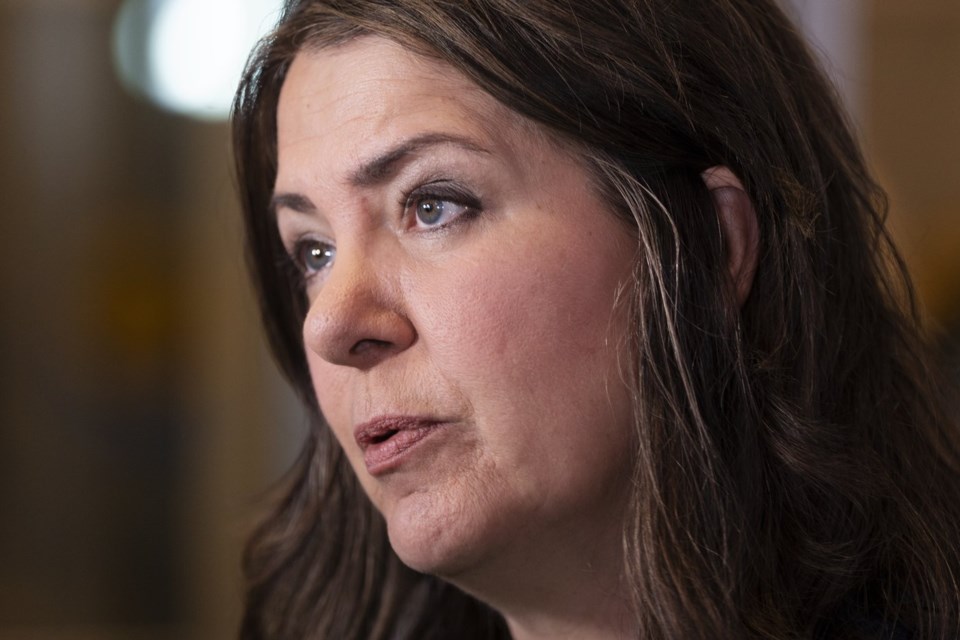EDMONTON — Alberta Premier Danielle Smith says her government is freezing its industrial carbon price effective immediately at $95 per tonne of emissions.
Smith told reporters Monday the move is critical to keep industry competitive and defend jobs as Canada navigates a tariff fight with the United States.
"With the change in government south of the border, it is essential that we have a reasonable carbon pricing system, not one that will price our industries out of global markets," she said.
The provincially set price was to rise to $110 per tonne in 2026 and increase to $170 per tonne by 2030.
Alberta, which has had an industrial carbon tax scheme since 2007, collects the funds paid by industry and returns them in the form of grants for emissions reduction technology or industry innovation projects.
Environment Minister Rebecca Schulz said industry had warned that any carbon price higher than $100 per tonne would be detrimental.
"(It) is not a common sense approach at a time like this, where the threats from outside our borders are so great, and the world is looking for Canadian energy right now," she said.
Schulz said the freeze, which will be in place indefinitely, will benefit industries like agriculture, forestry, and petrochemicals as well as oil and gas.
Canadian Association of Petroleum Producers president Lisa Baiton said she supports Alberta's freeze, and called on the federal government to fully reset its carbon regulatory scheme.
"Changes are necessary to establish a long-term signal to lock in investments and to reduce emissions, while remaining globally competitive,” Baiton said in a statement.
Pathways Alliance president Kendall Dilling agreed, saying in an email that Canada's carbon pricing system puts industry at a disadvantage when it comes to competing with companies in other jurisdictions.
"This announcement signals recognition of the pressures on our sector’s competitiveness," Dilling said.
"Additional discussion is needed to enable an approach to carbon management that is effective and enables investment in our natural resources.”
The alliance represents Canada’s largest oil sands companies working together to provide energy alongside environmental solutions.
Smith and Schulz said they hope the freeze will prompt that very conversation with Prime Minister Mark Carney, who's set to unveil his new cabinet Tuesday after last month's federal election.
Schulz told reporters that as a result of the freeze, Alberta will remain compliant with federal carbon pricing rules until Ottawa's benchmark is increased.
The prime minister's office did not immediately respond to a request for comment.
Smith said the freeze doesn't mean Alberta is giving up on its goal of reaching carbon neutrality by 2050, but said, "We have to be working with the federal government on having reasonable time frames as well as reasonable prices."
Critics disagree.
Stephen Legault, a senior manager at the advocacy group Environmental Defence, said with less money going towards clean technology development, Alberta's emissions target only moves further out of reach.
“A lot of us would agree Alberta isn’t serious about hitting those targets,” Legault said.
He also said an indefinite freeze suggests the announcement has less to do with the economic turmoil caused by American tariffs than it does appeasing the oil and gas sector that continues to make record profits.
Janetta McKenzie from the Pembina Institute, a clean energy think tank, said she expects the freeze to lead to decreased investment in decarbonized industries.
"We are going to need a leaner, cleaner oil and gas sector that is ready to compete in global markets, especially given most of our potential trading partners other than the U.S. are preparing to introduce new tariffs on energy imports that aren't subjected to domestic carbon pricing regimes," she said.
Opposition NDP energy critic Nagwan Al-Guneid said the freeze creates uncertainty for industry rather than protect against it.
"I think the biggest threat right now to our economic competitiveness is this flirtation with the separatist agenda, and not Alberta's industrial carbon pricing," Al-Guneid said.
— With files from Lisa Johnson.
This report by The Canadian Press was first published May 12, 2025.
Jack Farrell, The Canadian Press



